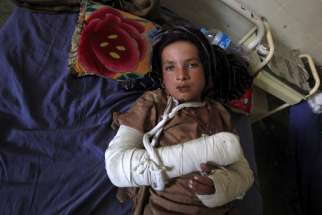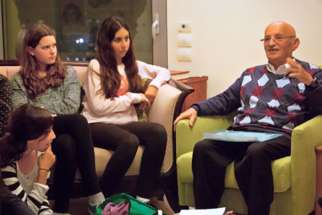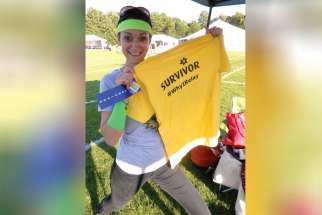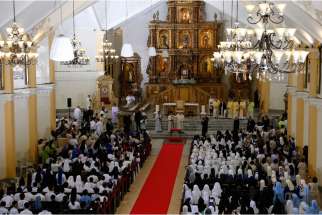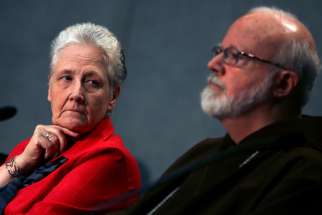Pope calls for prayers, aid after quake hits Pakistan, Afghanistan
VATICAN CITY - As the death toll from an earthquake in Pakistan and Afghanistan continued to rise, Pope Francis called for prayers and concrete aid for survivors.
Meeting with Holocaust survivors in living rooms
TEL AVIV - A variation on the serious theme of Holocaust testimony has brought survivors and young Israeli students together in living rooms to celebrate life while remembering atrocities.
High school chaplain fights cancer with faith
TORONTO - Fifteen hundred students at St. John Paul II Catholic Secondary School cheered excitedly during a 2013 assembly to welcome students back to school after a long summer vacation.
Amid typhoon's devastation, Pope tells survivors they are not alone
TACLOBAN, Philippines - Fourteen months after Typhoon Haiyan devastated much of the central Philippines, Pope Francis braved a tropical storm to encourage survivors in their ongoing work of recovery. The weather forced him to leave the area hours ahead of schedule, so he made up for reduced contact with words and gestures of characteristic spontaneity and emotional directness.
Typhoon survivors grateful Pope braved tropical storm for Mass
TACLOBAN, Philippines - Among more than 100,000 people who braved an approaching tropical storm and waited long hours to attend Mass with Pope Francis Jan. 17 were survivors of Typhoon Haiyan.
VATICAN CITY - A papal commission on child protection will be expanding its nine-member panel to include more experts and another survivor of clerical abuse.
Forgiveness can change the world as we know it
TORONTO - Nobody disputes that forgiveness is the right thing to do, or that it might sometimes be difficult. Immaculée Ilibagiza has much more than that to say about forgiveness.
The Rwandan genocide survivor and best-selling author believes forgiveness can be the basis of our society — the foundation for a different kind of politics, a better sort of media, a more purposeful economy, higher ideals in education, stronger families and a new world order.
“It’s about understanding that forgiveness is peace. Peace starts in the heart. It starts in the family. It comes to the country,” Ilibagiza told The Catholic Register.
Ilibagiza will be at the Marylake Our Lady of Grace Shrine in King City, Ont., Sept. 28-29 to tell her story and nudge the audience into a deeper understanding of forgiveness.
Ilibagiza’s story of survival in the midst of the 1994 Rwandan genocide is as raw and inspiring as any. She and seven other women spent 91 days in silence hiding in a bathroom at the church rectory. She began those 91 days as a 52-kliogram (115-pound) 24-year-old surrounded by family everywhere she went. She emerged just 30 kilograms (65 pounds) as one of the last surviving Ilibagizas. Only one brother, who happened to be abroad during the orchestrated massacre of 900,000 Rwandan Tutsi and Hutus judged too friendly with Tutsi, survived.
In the cramped bathroom, Ilibagiza had a Bible, a dictionary and a rosary her father had given her. With the Bible and the dictionary she learned English. With the rosary she deepened her relationship with Mary.
Outside the church yard she confronted a man armed with a machete — the same man who killed her mother and a brother. She said to him, “I forgive you.”
In the aftermath of the genocide, Ilibagiza worked for the United Nations and eventually moved to New York to work at United Nations headquarters. She would quietly tell her story to co-workers and friends, but it wasn’t the sort of story that could stay quiet.
Eventually she wrote Left To Tell: Discovering God Amidst the Rwandan Holocaust. No ordinary venture into religious publishing, Left To Tell became a New York Times best seller, has been translated into 15 languages and has been added to the curriculum for thousands of high school and university students around the globe.
By now, Ilibagiza has told her story hundreds of times. DVDs of her retreat talks sell online and she’s signed a contract with MPower Pictures to transform her story into a feature film. But the 42-year-old mother of two continues to be surprised by the effect her story has on audiences.
“I’m really more amazed by what people take from my story,” she said. “What people take is that forgiveness, in such a magnificent way, is in their hearts.”
Ilibagiza has been confronted with many audience members who, either at the end of her talk or weeks later, discover a capacity to forgive husbands, wives, parents, children, brothers and sisters. But Ilibagiza also emphasizes how personal and intimate acts of forgiveness within families and among friends can begin a process that reaches beyond that immediate circle.
The touchstone of Ilibagiza’s talks is the spirituality of the rosary. She has written a book about the apparition of Our Lady of Kibeho, a recognized Marian apparition from the early 1980s in a small town in Rwanda. The apparition included a vision of men with machetes and a warning about the dire consequences of turning away from God.
The economic and social implications of reconciliation and forgiveness are on display to the world in Rwanda today, Ilibagiza said. The number of universities and university enrollment have skyrocketed since the genocide. The economy is growing at eight per cent yearly and Africa’s most densely populated and deeply divided nation is discovering a new sense of citizenship that transcends ethnic identity, she said.
“People are building now more than ever, because they learned a lesson,” said Ilibagiza. “My reason to forgive is that I finally came to understand that people can change, people can learn, people are smart.”
Ilibagiza has taken her gospel of forgiveness to the Vatican and an audience with Pope Benectict XVI. She met with the Pope at the end of his Angelus address Sept. 4. She found the experience overwhelming.
Tickets to Ilibagiza’s talk at Marylake are $50 for general admission or $100 for reserved seating, a reception with her and a signed copy of Left To Tell. Call (905) 833-5368 or visit www.luvn4gve.ca.



